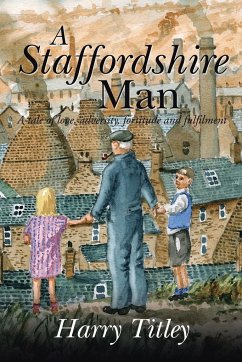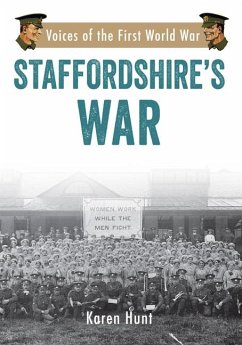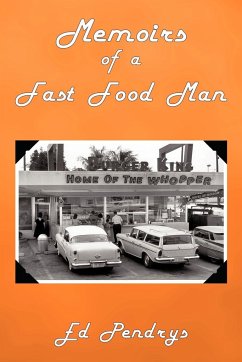
A Staffordshire Man
Versandkostenfrei!
Versandfertig in 1-2 Wochen
21,99 €
inkl. MwSt.
Weitere Ausgaben:

PAYBACK Punkte
11 °P sammeln!
Set in an industrial, relatively poor district of North Staffordshire, "A Staffordshire Lad' is a sensitive, innocent and frank portrayal of an ordinary boy growing up during the Second World War in an ordinary family amongst ordinary people. There are no heroes. It is a story that was common to tens of thousands of children born at this time and it is this very ordinariness that gives it its power. The story provides an insight into the author's grandparents, struggling to make ends meet, the risks of childbirth and the dangers to coalminers. It paints graphic descriptions of those times; exp...
Set in an industrial, relatively poor district of North Staffordshire, "A Staffordshire Lad' is a sensitive, innocent and frank portrayal of an ordinary boy growing up during the Second World War in an ordinary family amongst ordinary people. There are no heroes. It is a story that was common to tens of thousands of children born at this time and it is this very ordinariness that gives it its power. The story provides an insight into the author's grandparents, struggling to make ends meet, the risks of childbirth and the dangers to coalminers. It paints graphic descriptions of those times; experiences that were still prevalent during and after the author's birth. It provides a journey of a child born in the austere times of the mid-thirties, already under the shadow of war, through the conflict, family life, education, playing and development through to national service and adulthood. It contains many of the elements of wartime childhood such as rationing, evacuees, gas masks, air-raid shelters and identity cards. The author describes that some parts of the story are written reflectively and some retrospectively, ignoring the traditional rules of tense. "Sometimes I would type away in 'diary fashion' adding bits and pieces as they came to me, but more often than not I would get lost in the past and re-live the times as if they were happening for the first time'. It is more than a snapshot; it is a microcosm of the times when most people's lives were on hold, not only in the years prior to and during the war, but also for a long period afterwards. It is a work of social history that helps bring back powerful memories.













